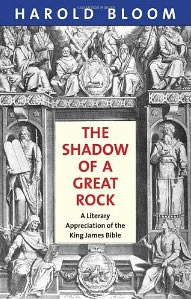Book Notes
 Harold Bloom, The Shadow of a Great Rock; A Literary Appreciation of the King James Bible (New Haven: Yale University Press, 2011), 311pp.
Harold Bloom, The Shadow of a Great Rock; A Literary Appreciation of the King James Bible (New Haven: Yale University Press, 2011), 311pp.
2011 marked the 400th anniversary of the 1611 King James Bible. The literary critic Harold Bloom is perfectly placed to reflect on what he calls "the sublime summit of English literature shared only with Shakespeare." Bloom was raised in a Yiddish-speaking Orthodox Jewish family in the Bronx. He taught himself English at the age of six. In addition to reading the Hebrew Bible his entire life (he's now in his eighties), he's studied the Greek New Testament since taking a college seminar at Cornell sixty years ago. He thus describes himself as a "lifelong exegete" of the Bible.
Bloom completed his PhD at Yale in 1955 and has been there ever since. His prolific output has been translated into forty languages. (In)famous for his controversial opinions, like defending the western canon of literature, the present volume doesn't disappoint. He tries to limit himself to literary and aesthetic matters, but it's impossible not to comment on the religious meaning of the texts. Bloom doesn't believe in Yahweh; in his mind God has broken the "contractual obligations" of the Covenant far too many times. Nor does he approach the text as the "word of God" like Jewish and Christian believers.
Most of this book considers the Old Testament since the Hebrew text takes up about 85% of the KJV; only the last fifty pages treat the New Testament. The KJV wasn't a new translation. As Miles Smith wrote in the preface to the first edition, the goal of the fifty translators was "to make a good one better, or out of many good ones, one principal good one." In particular, the KJV built upon the previous translations by William Tyndale, Miles Coverdale, and the Geneva Bible. Bloom compares and contrasts the stylistic differences of the four translations by including long quotes from the Bible.The only major criticism among his effusive praise is that the KJV imposes a "tonal uniformity" of style that silences the distinct voices of the Biblical writers; David, Isaiah, and Amos shouldn't all sound the same!
Bloom goes ballistic when he comes to the New Testament. Its Greek is vulgar compared to the literary glory of the Old Testament Hebrew. Christianity's triumphalistic supersessionism of Judaism repulses him. Except for Paul and James, he judges the New Testament a "viciously anti-Semitic work." The "Belated Testament has hatred at its core despite its doctrine of love." He accuses Paul of a "massive misreading" of the Old Testament. That's not an original conclusion, or unexpected from someone as opinionated as Bloom. Nor does it detract from his otherwise deep appreciation for one of the most formative books in the history of the English language.
* For this and other books about the 500th anniversary of the KJV, see Robert Pogue Harrison, "The Book from Which Our Literature Springs," New York Review of Books (February 9, 2012).


